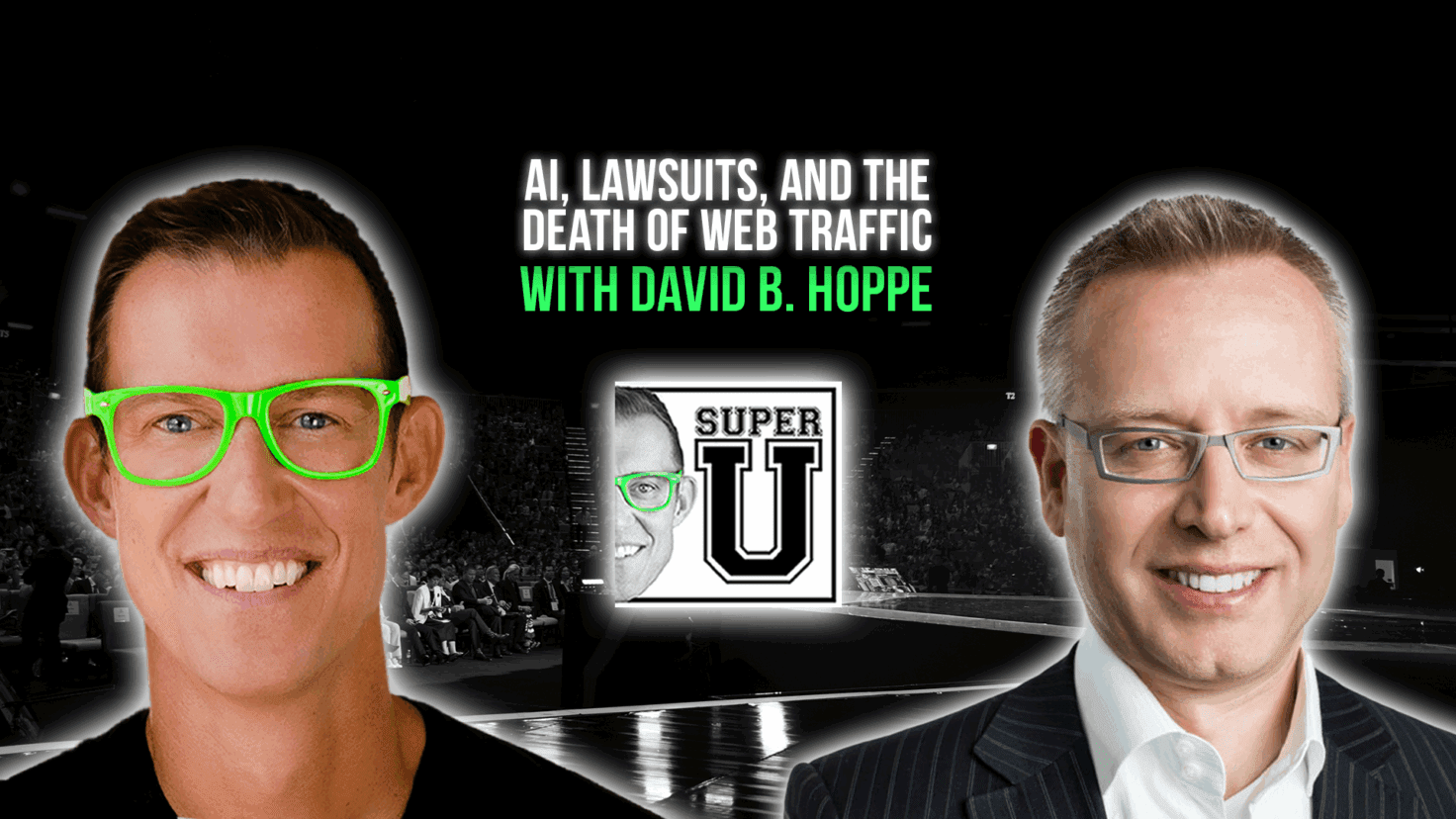Super U Podcast | 7 Super Tips with Jamie Dimon
Jamie Dimon, CEO of JPMorgan Chase, billionaire, and businessman gives us insight on the importance of learning, how to deal with failure, and why humility leads to success.
5x #1 Bestselling Author and Motivational Speaker Erik Qualman has performed in over 55 countries and reached over 50 million people this past decade. He was voted the 2nd Most Likable Author in the World behind Harry Potter’s J.K. Rowling.
Need a sneak peek? Below are the main takeaways from the episode.
Super U Podcast | 7 Super Tips with Jamie Dimon:
[6:30] Tip #1
“Learning is a lifelong thing. It doesn’t end at Harvard Business School, it’s your responsibility. I think, if you’re in any profession at all, you have to do it consistently, all the time. I think I spend probably 50 or 60% of my time learning, reading, talking to people traveling as the only way you can keep on top of this global world of ours. And it’s even tougher now because of the globality of the businesses, you’re all going to deal in how reading is the most important one. But the second one, which is often forgotten is talking to other people. You can learn more from speaking to people in 15 minutes, than if you spent your life doing something, they can explain it to you. And you can learn from watching people, you also are going to learn by I’m going to call it imitation. But by watching other very good people and how they operate in difficult circumstances. I learned a lot of things, what not to do, and a lot of what to do by watching other people.”
[8:38] Tip #2
“Go to work a place where you respect the people you think the company has the kind of culture like is going to grow as to be ambitious, and your career will take who knows what path and you know, do think ahead a couple of jobs so that you’re always thinking maybe what I might want to do next. And you know, at one point, like you have to make a vertical switch or some point life may get fired like some of us have been you know, war. And those are hard things, but it could be a very good thing. So some I’ve always been fine. Some people said that’s what they want. And they’re looking up those 100 stairs and they’re always measuring how quickly the going versus there. And that’s you don’t you’re not doing the right thing. You’re not enjoying your job. You’re, you’re uh you know, it takes a lot of luck to get to that top rung sometimes and, and if you’re really good, you’ll probably get there may not be at that company, there may be somewhere else. So I tell you to enjoy your life. Enjoy every step of it. And don’t worry too much about that kind of ambition.”
[10:17] Tip #3
“Many of you already have dealt with some very difficult times. So this is no different than some of you already dealt with. When you fail, it’s okay to get depressed. okay to cry, it’s okay to go home. It’s okay to blame others for a while. But eventually, you have to get over it and move on. The greatest people have ever walked this planet. And I’m talking about I’m not talking business people. I’m talking about people like Nelson Mandela and Abe Lincoln who constantly had setbacks in life and failures, constantly, all the time in business, and some of your success will be how you deal with the failure, not how you deal with success. When I get introduced, I always get introduced that 1998 I was the president of Citi Group. And in 2000, I took over bank one. I was fired in 1998. So I went a little bit of experience like this, and it’s a painful thing. My boss had worked for 15 years called me in and said, We want you to resign. So I said, Okay, I went home, I told my wife and children, I called my wife up and said, Judy, I’m going to tell you something. I’m not kidding. Because I always make jokes about things like that. But I wanted to make sure the kids were fine. I went home. I have three wonderful daughters. They were much younger than I said the oldest youngest one said, Dad, do we have to sleep on the streets? I said no, hon, we’re okay. The middle one who just graduated Barnard said Dad, can I still go to college? I suggest to you can. And I knew things were fine. When the oldest one is going to Harvard Business School said, Dad, I have that little cell phone you have you won’t be needing it. remind people when you fail at something, it’s your I told you about Citigroup is my net worth, not my self-worth. And I was able to move on. And yes, it was difficult. I did call my boss A year later, he did not call me I called him and said it’s time to break bread. We went to lunch together. I told him that identity did the right thing for Citigroup, which is pretty obvious at this point. But I told him the mistakes I made. And what was 4060 or 6040 wasn’t important. I wanted to learn from the experience and move on.”
[13:24] Tip #4
“But you know, you all know management is is I think it’s kind of a relentless process. So I guess first, like someone said we would have would change in the crisis versus before nothing. It’s like if you’re not prepared for tough times, you’re not gonna be you can’t like to get prepared when times get tough. Like you need the army before the war starts. And so that means a disciplined group. They know what they’re doing. The only real difference is that the risk committee used to meet once a week for a couple of hours, and in the crisis met at 7 am 12, lunchtime, five o’clock, 10 o’clock, 5 am overhead to 24 seven for six straight months. And we had to say it wasn’t very formal. We said, Hey, if you’ve got a problem, go to the mean and bring the people got to have and everyone shares the reports and shares the information tries to react very quickly.”
[15:55] Tip #5
“There is already a book on you. That book is already being written. And if I spoke to your teachers, your friends, your professionals, your parents, I would know whether you trusted how hard you work with your ethics, I would know so much about you, you’d be shocked, I don’t even have to meet you. So that book is already growing. You should you write the book, you want the way to be written, you actually have that choice. And you can do it as you want. Now. Don’t let others write it. And when you get caught in situations that you’re uncomfortable, I remember I worked at a company not far from here. And I remember I was asked to do something I didn’t want to do, I’m not to tell you, I’ll take this advice, you can always quit. It’s your responsibility, whether you accept to do something or not. And it will be in that book written on you.”
[17:48] Tip #6
“takes humility and humanity to be accountable. We all stand on the shoulders of those who came before us. Humility is the realization that those who came before paving the way, never fool yourself into thinking that your success is yours alone. Your success is the result of your parents, the family was sacrificed to give you a better life. Your professors and administrators will help you get through your time your Syracuse, your friends, neighbors, those who encourage you. In fact, this wonderful country, whose bounties we all benefit from, was built by so many people who made endless sacrifices, often the ultimate sacrifice, before most of us were even born is important to respect what they have done and to be grateful for.”
[19:21] Tip #7
“Well, when you’re young, it’s hard to say leadership characteristics. But so I mean, there’s just some basic stuff and other people who know a lot, you know, so there are some people walk into your office and say, gee, I’d like to know about the strategy of the company. And they didn’t bother to read the chairman’s letter that I wrote, which is like 30 or 40 pages long. There, people will walk in and say, you know, you really should be thinking about doing better digital services. But then look at the ones we do do. The other people walk in and they know everything. And so when they have a conversation, they’re actually enhancing your life as opposed to the way around so you know character is a sine qua non and by character also mean that they tell the whole truth, nothing but the truth. They don’t shave the truth. And they say the same thing to you that they say to you. Because the second I see people doing something different than that, you just go on a list to me, I have no interest. I don’t have time for that I want to have interested in so and people who are good at you know, relate well to people so, so a variety of things.”
Click here to subscribe and listen to the full episode.
Connect with Jamie Dimon:
LinkedIn: https://www.linkedin.com/in/jamie-dimon-65634172

To ensure you don’t miss future episodes, subscribe to our podcast by clicking here >> Super U Podcast. We hope these tips help unlock and unleash your inner superpower!
The Super U Podcast is hosted by #1 bestselling author and Motivational Speaker Erik Qualman.





